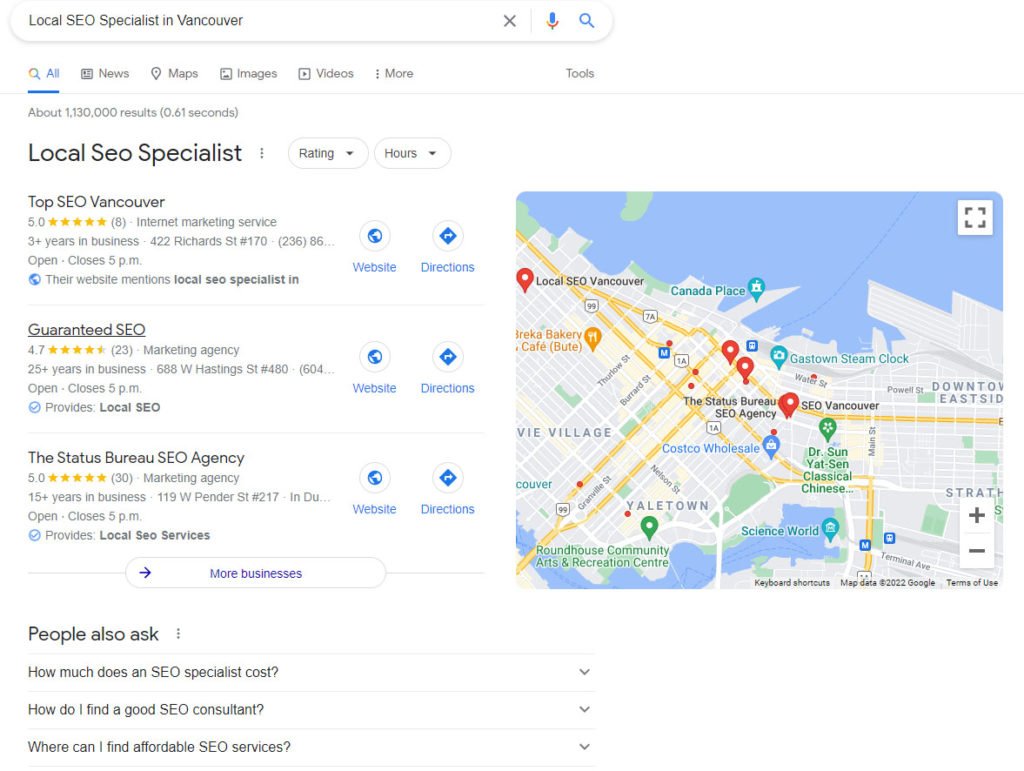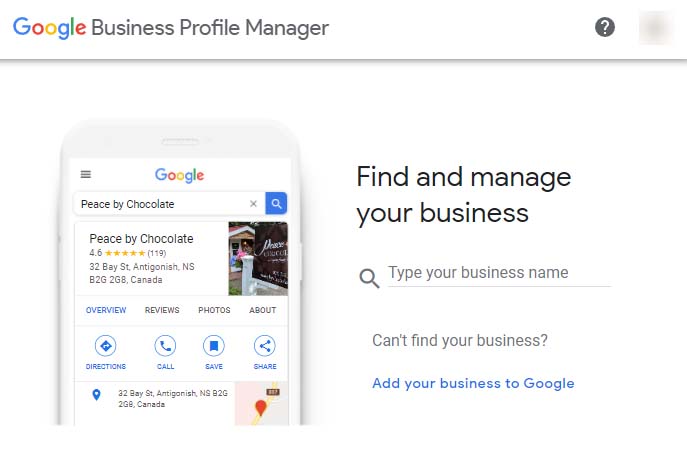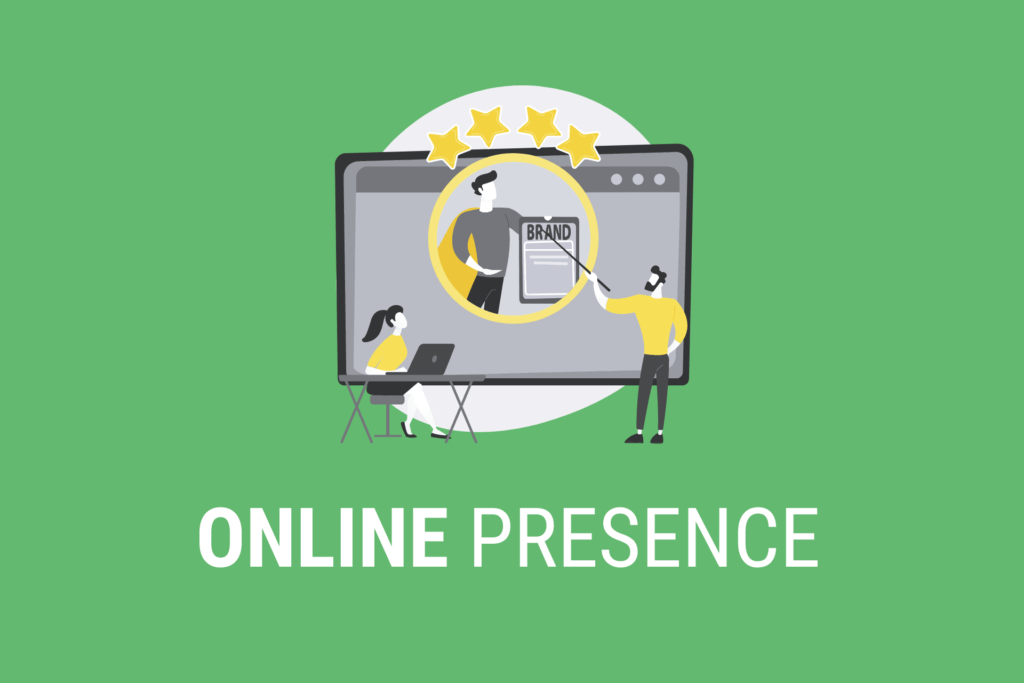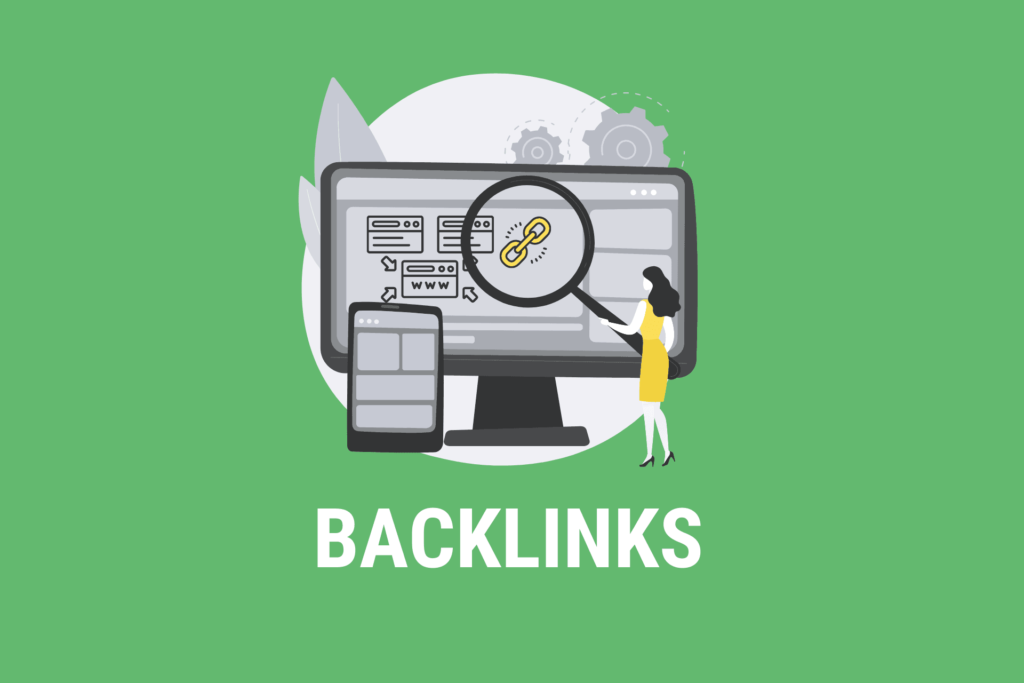You’ve probably heard this term mentioned in marketing circles, but what is local SEO?
The simplest definition of local SEO is the process of optimising businesses for local searches.
More specifically, local SEO is the process of enhancing your organic rankings in local search results pages (SERPs) for location-based keyword phrases.
Now that we’ve got a working definition, let’s take a deeper look into local SEO and how local businesses can compete in specific markets.
Local search is when a user performs a search for a product or service and may include a location in the search query.
So let’s try that and search for “Local SEO Specialist in Vancouver”

The results that you will see are businesses located in Vancouver that compete for this query.
To gather information for local search, search engines rely on signals such as local content, social media profile pages, links, and citations to provide the most relevant results to the user’s queried location.
To give you a better idea of how local optimization works, let’s take a quick look at some SEO best practices.
Google My Business is your FREE local Google listing and the first step of getting your business to the next level. Regardless of your industry or type of service that you provide, making sure your Google My Business page is optimised for local search is crucial. You can create your own listing by following the steps in the Google My Business dashboard.

Google will ask you to verify your local business listing with a few key pieces of information:
Address, phone number, and website.
Make sure that these details are correct and up-to-date. Google will use this information to localise your directory listing and provide users with local search results.
Once you’ve filled out all of the information you will need to verify your business by a postcard sent by Google to the address of the business.
In order to maximise how often users find your business in local search results, ensure that your business information in your profile is accurate, complete, and engaging.
As we said above this is just the first step. Now we will go over other SEO practices that will help you improve your online visibility. We will cover techniques that go beyond the optimisation of your GMB page and include your own website, social media, and business directories. Because, at the end, when it comes to local SEO, it’s all connected.

How does your business appear in the local search results? Is the information accurate? If your address is incorrect, you are probably not appearing in local SERPs for that keyword phrase. For local SERPs, we recommend checking for accuracy and updating information.

We mentioned that you should keep an eye on the information on your social media for consistency, but what is the role of Social media and does it actually help for local SEO?
Social media does not directly contribute to SEO ranking, but the links you share across social platforms and your activity there increase brand exposure and keep your followers engaged. To some extent, your social media activity could add up and start influencing search engine rankings:

Wait, are we entering the deep waters again?
Actually, yes! Your website is the place you will spend most of your time and efforts when optimising your business for Local SEO. Remember, your goal is to rank for local search phrases that are being used by nearby customers, which will help them find you, so you need to…
Today, more searches are being performed on a mobile device than ever before. Additionally, local search and mobile search go hand in hand (61% of all Google searches are performed on mobile).
Further research from Think With Google shows that some of the most common ways people will use your site in a mobile environment is to look up reviews, find directions to your location, and search for contact information.
In fact, “near me” searches on mobile have increased 250% since 2017.
This shows that prospects and customers alike are using their smartphones to discover businesses near them.
So, if you own a business website not optimised for mobile viewing, you should take immediate steps to ensure it is mobile-friendly.
To get local customers to the right page, it’s important to use a geo-targeted URL. In general, avoid using session IDs, tracking numbers, and lengthy URLs. The URL should accurately describe the page’s content to local search engines.
Put your geo-targeted keywords in the URL. If you’re targeting local customers in Vancouver,BC and writing a page or a blog post about local SEO, then your URL should include local SEO. It might look like this:
https://www.example.com/vancouver-local-seo/
The title tag is the primary local search result snippet, so it’s important to use local keywords in your title tags. The title tag should accurately describe the page’s content to the search engines.
Include the location in your title. A business providing local seo services targeting people in Vancouver, BC might have a title like this one:
<title>Vancouver Local SEO Experts | Guaranteed SEO</title>
Then on your landing page, your visible page title, the H1 heading, could be similar to your title tag and it might look like this:
<h1>Your Vancouver Local SEO Experts</h1>The meta description is an important local search result snippet, so it’s important to use location in your meta description. As we are targeting users in Vancouver, we should use it along with “local SEO” such as:
<meta name="description" content="If you are looking how to improve your Local SEO presence in Vancouver, reach out to our digital marketing experts. Helping local businesses like yours since 1996.">
You’ve heard that the “Content is King”, right? Of course, you have! We are not going to explain here the importance of writing compelling content for your website because you can find all of that on our blog already.
There is no doubt that local content is key to local SEO. Here are some ideas on how to integrate location-based content within your web pages for you to consider.
Your About page is the best place where you can describe your team or company values and principles and to highlight your involvement in your local community.
Service pages are important too. These could be anything from product pages to company information pages. As a business providing local services you need to be found by potential clients when they are looking for services in their area. That’s where your service pages come to the rescue.
You could also create high-quality content that showcases your finest accomplishments. After completing a project, get the word out! As long as you take pictures or video footage to highlight how the project was a success, you’ll have plenty of material to create a dedicated page on your website, upload a video to YouTube, share all this with your social media community… so when someone searches for your services in the same area there is a good chance that Google will display your successful project page as part of the top results.
Another habit you should add to your completed project to-do list is asking your newly satisfied client to write a review for work you just provided. This would add even more value to the content you created in the eyes of your website’s visitors. Additionally, if you have enough reviews you can build a testimonial page or display them in different sections of your website.
These reviews could also contribute to your Google local listing relevancy. As long as your clients leave them directly on your GMB local listing.
Having content on your website that relates to specific cities or areas would be a great way for you to improve your chances of reaching local customers or entering new markets.
For example, if your business is located in Vancouver but provides services to the entire province, it will make perfect sense to have location pages for other cities you are servicing Even if you don’t have an actual office in that area, tailoring content that targets those users could increase your search rankings when they search for companies servicing their community.
Having a blog on your website can allow you to express your creativity and to go beyond the “normal” type of content that your competitor’s websites have. You can basically write about whatever you want. Yay!
Wellll..
Maybe not the best idea. Better keep it professional and relevant to your business. After all, you are the EXPERT, so take advantage of that use your blog to write about:
Think about the questions that people usually ask you and create a list that you can show on your website.
Case Studies do not make sense to all types of businesses but when they do, they could be very useful for your potential clients while allowing you to provide more local-oriented content to your website. In a sense, they could be somewhat similar to the Portfolio/Project pages.

Backlinks are an important part of local SEO because they send a signal to search engines that other websites value your website’s content.
When multiple websites link to the same webpage, search engines can assume that the content is valuable and that it’s worth ranking on a local SERP. The more high-quality websites that link to your own, the more confidence Google, Bing, and other search engines have in your website.
The internal linking structure is the skeleton of your website, providing your internal pages with support and direction to increase page authority and ranking power among pages. Without it, internal pages won’t show up in Google’s index or have room to rank in internal search results.
Proper link organisation and structure will help users to reach important pages easily by clicking on links, call to action or navigation links.

This shouldn’t be anything new for you. If you’ve reached that far it should be quite clear that one of the most important things in Local SEO is the relevancy and how consistent your information is on all platforms that you manage, including your own website.
Just make sure your contact information matches your local listings. It will usually be located in the header and/or footer of your website, and very likely on your contact page, obviously.
Have your address and phone number clearly displayed on your website as well as any other tools or information that is required for local clients to reach you and inquire about your services.
An easy-to-use contact form or a chatbox, or a call button for your mobile website could do wonders for your conversion rate.

Don’t hesitate to contact us if you need help with your local SEO strategy and want to see our professional input about how we can help you achieve your goals.